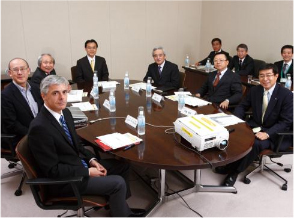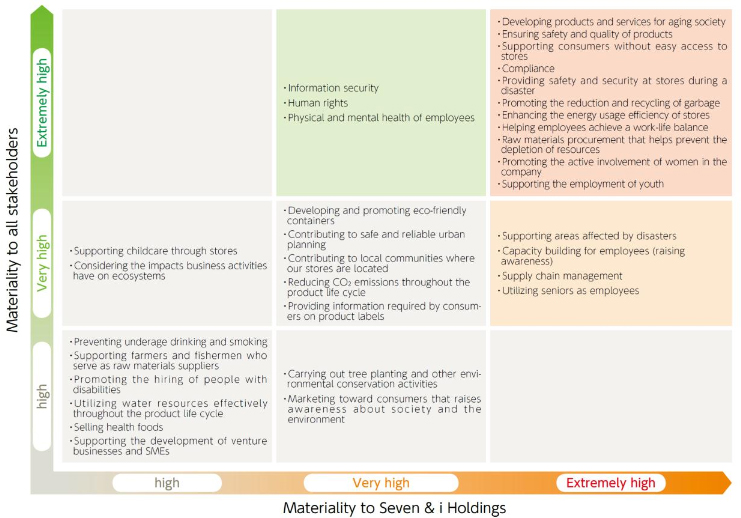- Top
- Sustainability
- Index for Researchers
- 02policies
- Identifying Material Issues
- Sustainability
- Statement
- Message from the President
- Basic Policies of Sustainability Initiatives
- Sustainability Management
- Stakeholder Engagement
- Business Partners
- Seven & i Group Material Issues
- Compliance
- Information Security and Personal Information Protection
- Human Rights Initiatives
- Human Capital Initiatives
- Responses to Climate Change (TCFD) and Nature (TNFD)
- Response Based on the Taskforce on Climate-related Financial Disclosures (TCFD)
- Taskforce on Nature-related Financial Disclosures (TNFD)
- Social Contribution Activities
- Disaster Reconstruction Support
- Disaster Assistance
- Overseas Initiatives
- Sustainability Data Book
- External Recognition and Awards
- SASB/GRI Index
- Index for Researchers
- Keyword search
- Editorial Policy
- Social
- Environment
Identifying Material Issues
In summer 2014, Seven & i Holdings worked through the following process to identify issues that require particular attention.
Step 1Selection of social issues that should be considered
We created a list of 92 items from multitude points including issues that require attention under international frameworks such as ISO 26000, the Millennium Development Goals, and the GRI Guidelines G4; inspection items used by CSR rating agencies when evaluating companies; and issues that have been highlighted by the Japanese government. Among these, we selected 33 issues that we consider to have special relevance to the operations of the Seven & i Holdings Group.
Step 2Survey of stakeholders to determine which social issues they expect the Seven and i Group to address
To grasp stakeholders’ ideas on what kind of priority Seven & i Holdings should assign to the 33 selected issues, we surveyed our customers, business partners, shareholders and investors, and employees. Furthermore, we also surveyed Company personnel of general manager rank and above to find out how they perceive the importance of these issues with regard to the Company’s operations.
Through these surveys, we evaluated each of the 33 social issues on two scales: “materiality to stakeholders” and “materiality to the Company’s operations.”
Step 3Dialogue with stakeholders

We held dialogues on the results of evaluation, between senior management, such as COO of Seven & i Holdings, and experts on CSR. The experts offered advice to management based on the expanding scale of Seven & i’s business and along-term perspective.
Dialogue date:
- May 2014
Participants:
Experts
- Toshihiko Goto
Representative Director, Sustainability Forum Japan (non-profit organization) - Hideto Kawakita
CEO, IIHOE (International Institute for Human, Organization and the Earth) - Scott Davis
Professor, Rikkyo University / Outside Director, Seven & i Holdings
Seven & i Holdings
- Noritoshi Murata, COO
- Katsuhiro Goto
Managing Executive Officer and CAO - Junro Ito
Director and Senior Officer of CSR Department
Example of advice:
- Be aware of environment, society, and governance (ESG) in business management
- Build business models with a view to society 20 years into the future
- Create value through products and services
Material Issues for Seven & i Holdings
Based on the opinions of stakeholders, the Company itself, and CSR experts, Seven & i Holdings has specified the materiality of each of the 33 issues that it should address. We will take action on these issues through the CSR Management Committee, the respective subcommittees, the CSR Department, and our respective operating companies. Our 33 material issues are organized under the following five categories.
- *
- Compliance related issues have not been included among the material issues because they need to be addressed as a matter of course.
Materiality Matrix

Five Categories
1. Providing social infrastructure for an aging society and declining population

In Japan the number of seniors living alone is increasing every year, and by 2030 it is expected to have increased by 1.5 times from 2010. Meanwhile, expectations of a sharp decline in neighborhood social infrastructure, such as retail stores, government offices and bank branches, are causing concern over an increase in people suffering inconvenience in daily life. To address such social issues, the Group will create new shopping support services byutilizing the infrastructure it has built up, including its store network and logistics and information systems.
2. Providing safety and reliability through products and stores

In response to growing customer interest in food safety, companies are being urged to tighten their quality control systems even further. Stores are also viewed as playing an increasingly important role as lifestyle infrastructure amid widespread concern over whether people will be able to buy essential products and services for living as usual in the event of a major disaster. We are responding to these concerns by devoting even greater efforts to creating products and stores that are safe and reliable.
3. Non-wasteful usage of products, ingredients and energy

The Seven & i Group has continued aggressively opening new stores and developing products and services. However, the increasing number of stores, products, and services has been accompanied by an increase in electricity consumption and waste volume. We are addressing this issue by making effective use of limited resources and reducing the environmental impact of our business activities.
4. Building an ethical society and improving resource sustainability together with customers and business partners

Over 20,000 varieties of fauna and flora are said to be facing extinction around the world today. Production plants in developing countries are considered to be troubled by human rights issues relating to workers, such as low-paid labor and child labor. This environment is driving an increasing interest in “ethical consumption,” which looks beyond price and quality to consider ethical aspects related to the global environment and society. We will strive to respond to these concerns as we create products.
5. Supporting the active role of women, youth and seniors across the Group and in society

A company’s true competitive strength springs from its human resources. In Japan, however, the birth rate is in decline, and the population is advancing in age. Over the next 30 years or so, the productive-aged population is projected to decline by over 20 million. To create appealing, fulfilling workplaces, we will develop systems that enable all employees to work to their individual potential regardless of their personal situations. We will also focus on supporting working women in general, not only our own employees, by providing products and services to help women who are tackling the challenge of raising children while working.

